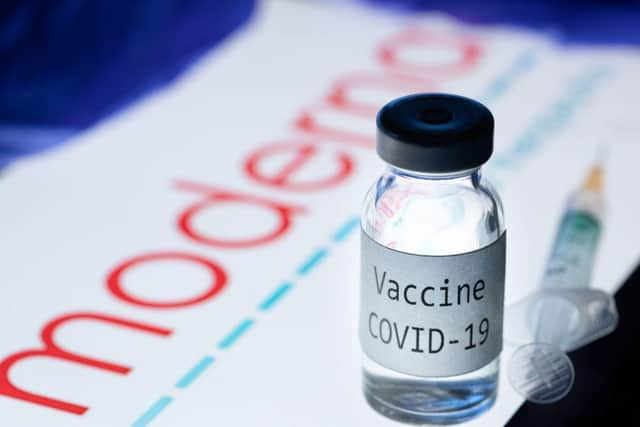Covid 19 vaccines: how do the Oxford AstraZeneca, Pfizer and Moderna jabs compare, are there side effects, and how effective is each?
and live on Freeview channel 276
The UK became the first country in the world to approve a Covid vaccine when medicine regulators MHRA gave the Pfizer / BioNtech jab the green light on 2 December.
It is the news many have been waiting for as updates came throughout November around the development of Covid vaccines, with the best medical and scientific minds around the world looking to provide an end to the coronavirus pandemic.
Advertisement
Hide AdAdvertisement
Hide AdPfizer / BioNtech and Moderna both recorded high efficacy ratings of its vaccines when in late trials, Janssen launched a late stage clinical trial and the University of Oxford / AstraZeneca jab has also returned encouraging results.


They are all steps forward in the fight against coronavirus and a return to normal life.
The development of an effective vaccine is seen as key to the government’s hopes of overcoming the virus outbreak, which has overshadowed the majority of 2020 - and put a variety of restrictions on ways of life in an attempt to suppress infection rates.
But with so many vaccines being worked on - believed to be more than 200 globally - it can be a tough time keeping track of which one is leading the race for approval.
How do the Oxford, Pfizer and Moderna vaccines compare?
Advertisement
Hide AdAdvertisement
Hide AdThe UK’s Vaccine Taskforce has secured a total of 355 million vaccine doses from seven different candidates, including ones from Oxford / AstraZeneca, Imperial and Pfizer / BioNTech, Moderna, Janssen, Valneva, Novavax. It has also secured rights to AstraZeneca’s antibody treatment to neutralise the virus.
The Oxford vaccine is an adenoviral vaccine, which takes a harmless virus that infects chimps and genetically modifies it to resemble Covid to seek a response from the immune system.
Early results from the Oxford trials show a strong immune response in older adults, in their 60s and 70s, and are also testing whether the vaccine stops people developing Covid.
Results published on Monday 23 November revealed the Oxford vaccine prevented 70% of people from developing Covid symptoms.
Advertisement
Hide AdAdvertisement
Hide AdThe Pfizer and Moderna jabs are similar in structure. Known as an RNA vaccine, both approaches involve injecting a small part of the virus’ genetic code into the body to train the immune system to fight off any further possible infections.
Both have returned high efficacy rates, with Pfizer initially reporting a 90% rating and Moderna a 95% rating. Pfizer has since stated its jab is 94% effective in over-65s.
As encouraging as these reports are - and despite no known major side effects - words of caution have been expressed as no vaccine has yet been approved by the Medicines and Healthcare products Regulatory Agency (MHRA) in the UK.
Which vaccine will be ready first?
The University of Oxford / AstraZeneca vaccine was widely understood to be winning the race to be the first vaccine to get approval – but it is the Pfizer / BioNtech jab that is first to be rubber stamped.
Advertisement
Hide AdAdvertisement
Hide AdPfizer applied for emergency approval of its Covid vaccine from US regulators on Friday 20 November and lodged the paperwork with the UK’s MHRA on Monday 23 November.
It hopes to supply 50 million doses worldwide of the vaccine this year if successful. The company aims to produce 1.3 billion doses throughout next year.
The UK, through its Vaccine Taskforce, has procured six different types of vaccines in recent months since the outbreak. It has agreed to get 10 million doses of the Pfizer vaccine by the end of 2020 and a further 30 million doses in 2021.
Moderna is planning on applying for approval in the US in the coming weeks before seeking approval from various countries around the world. The UK will receive five million doses of the Moderna vaccine by spring of next year.
Advertisement
Hide AdAdvertisement
Hide AdThe Oxford vaccine, meanwhile, is said to be easier to manufacture than the other two, meaning it could be made available faster once approved. A total of 100 million doses will become available in the UK, with hopes of priority groups receiving it early next year.
It too has filed an application for approval from the MHRA.
The other big hitter - the Janssen vaccine - has just begun clinical trials in the UK. It is not expected to form part of the government’s first wave of vaccine rollout as it won’t be available until mid-2021 at the earliest, with the UK reaching an agreement for 30 million doses.
What other vaccines are close to being developed?
There are hundreds of vaccines in development all over the world as scientists and medics look to bring an end to the coronavirus pandemic.
Several of these are in the final stage of testing, including one from Wuhan, where the first case of the virus was reported earlier this year.
Russia's Gamaleya Research Institute and China’s Wuhan Institute of Biological Products and Sinopharm are both in late testing of their respective vaccines.
